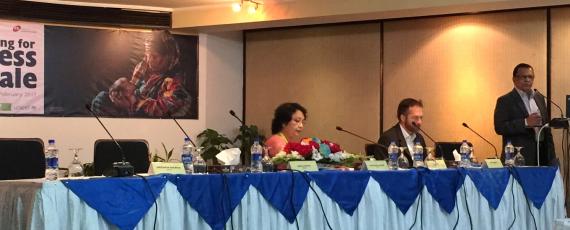Conference on Delivering for Success at Scale in Bangladesh
The BRAC, ICDDR,B and Institute of Development Studies(IDS) joint conference on February 7-8, 2017 built on the longstanding partnership between the three organisations to explore the role of knowledge in the conceptualisation, design, delivery and management of development programmes and policies.
Bangladesh has been a lead player in the use and integration of research into development decision-making, notably in relation to health systems, nutrition, social protection, agriculture and poverty. Keeping in mind that evidence will continue to be important in strategic development planning by the Government of Bangladesh among others, the conference included examples of how high quality research can be embedded within programmes, showcase research findings, discuss the challenges of integrating research with programmes, highlight successful examples and discuss future needs.
Abdul Bayes, LANSA-BRAC team lead was invited to make a presentation on ‘Leveraging Agriculture for Nutrition: A Bangladesh Case’ based on LANSA’s work in Bangladesh. The paper was presented in the fourth session on ‘Stories of Change in Nutrition in Bangladesh’ on 8 February 2017.
More than 125 participants attended the two days conference. Participants from IDS, BRAC, ICDDR,B, Transform Nutrition Programme, Future Health Systems, Institute of Disease Control Research (IEDCR), Indian Institute of Health Management Research (IIHMR), IFPRI Delhi and Dhaka Office, James P Grant School of Public Health (JPGSPH), Save the Children Bangladesh, Pathfinder, Diabetic Association of Bangladesh, TAHN Foundation, Bangladesh Breastfeeding Foundation, UNICEF, WaterAid Bangladesh, Population Council and many other GO/NGO stakeholders in the areas of Nutrition, Health, Agriculture attended the conference.
Conference Links are as follows:








